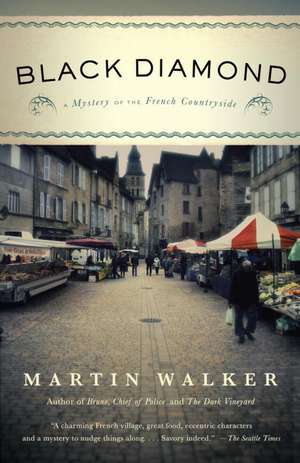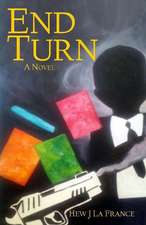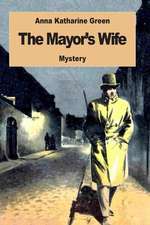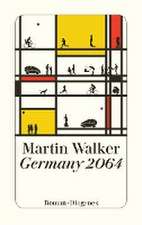Black Diamond
Autor Martin Walkeren Limba Engleză Paperback – 30 iun 2012
| Toate formatele și edițiile | Preț | Express |
|---|---|---|
| Paperback (2) | 53.62 lei 3-5 săpt. | +27.29 lei 7-13 zile |
| Quercus Books – 29 sep 2011 | 53.62 lei 3-5 săpt. | +27.29 lei 7-13 zile |
| VINTAGE BOOKS – 30 iun 2012 | 96.52 lei 3-5 săpt. |
Preț: 96.52 lei
Nou
Puncte Express: 145
Preț estimativ în valută:
18.47€ • 20.12$ • 15.56£
18.47€ • 20.12$ • 15.56£
Carte disponibilă
Livrare economică 02-16 aprilie
Preluare comenzi: 021 569.72.76
Specificații
ISBN-13: 9780307744630
ISBN-10: 0307744639
Pagini: 297
Dimensiuni: 131 x 204 x 17 mm
Greutate: 0.25 kg
Editura: VINTAGE BOOKS
ISBN-10: 0307744639
Pagini: 297
Dimensiuni: 131 x 204 x 17 mm
Greutate: 0.25 kg
Editura: VINTAGE BOOKS
Notă biografică
Martin Walker is senior director of the Global Business Policy Council and editor in chief emeritus and international affairs columnist at United Press International. His previous Bruno novels, Bruno, Chief of Police and The Dark Vineyard, were published to international acclaim. He lives in Washington, D.C., and the southwest of France.
www.brunochiefofpolice.com
www.brunochiefofpolice.com
Extras
Chapter 1
There were not many times that Bruno Courrèges disliked his job. But today was certainly one of them. The weather was not to blame, a crisp day in late November with thin, high clouds trailing feebly across a sky that was determined to be blue. And even this early in the morning the sun was warm on his face and lending a rich gold to the few remaining leaves on the line of old oaks that fringed the town's rugby field. It gave warmth to the aged stone of the mairie across the river and to the red tile roofs of the houses that climbed the hillside. The season was still mild enough, he noticed, for the women to have thrown open their windows and the blue wooden shutters. Splashes of white and blue, stripes and floral patterns, adorned the townscape where they had heaped out bedding to air on the balconies, as their mothers and grandmothers had done before them. It might be the last day of the year that would be possible. A touch of frost had silvered the grass outside his cottage when Bruno walked his dog just after dawn that morning, and he had heard the first of the Christmas Muzak in the supermarket over the weekend.
Bruno turned back to the scene before him, the small crowd waiting outside the silent sawmill, its chimney no longer sending plumes of smoke into the clear sky. The forklift trucks that usually scurried like beetles around the warehouses under their loads of timber were all parked neatly in their garage. The air still carried the wholesome scent of fresh-cut wood. But the memory would soon fade, since this was the day that the sawmill, one of the biggest and oldest employers in St. Denis, was to close its doors.
Bruno himself, acting under orders, had two weeks earlier delivered the formal notice of closure from the prefecture, citing the legal judgment against Scièrie Pons and its owner for breach of the new rules on pollution in urban areas. As the town's only policeman, Bruno had tied a copy of the order, wrapped in plastic against the weather, to the sawmill gates. Now he had to stand watch as the law took its solemn course and the court ruling was carried out. And of course he was obliged to deal with whatever ill feeling followed from this long- running feud between the jubilant Green Party and the man they called "the arch-polluter of St. Denis."
"Pons out, Pons out," chanted the crowd, led into a chorus by a handsome man with a bullhorn, an expensive leather jacket and a white silk scarf. His long blond hair was tucked into a neat ponytail, and he wore a large Green Party button on his lapel. The posters the crowd carried explained the closure. There had been no economic calamity, no financial embarrassment, no sudden shortage of timber that the woods and forests of the Dordogne region had produced for centuries. There was no shortage of demand for the oak and chestnut, pine and hemlock. Indeed it was known that Boniface Pons, the owner of the sawmill that had been in his family for generations, was simply shifting his entire enterprise to another commune with wide forests and fewer than two hundred voters, where he had been assured there would be none of the angry demonstrations and the endless lawsuits that had driven him from St. Denis.
At last, our children can breathe, read one of the posters, which made Bruno roll his eyes at the exaggeration. He had played countless hours of rugby on the nearby playing field and endured dozens of training sessions while the chimney still spouted and never felt out of breath.
Environment 1-pons 0, read another poster, which for Bruno was closer to the truth. Pons's sawmill had, over the decade of Bruno's time as the town's policeman, installed two separate sets of scrubbing equipment for the steam and smoke that belched from the tall chimney. Each installation was supposed to be the latest in clean-air technology, yet within a few years each had been overtaken by new pollution directives from the European Union in Brussels. The most recent directive, which required any business with a polluting chimney to be a minimum distance from the nearest housing, had been the final straw for Boniface Pons. It was not his fault, Pons maintained, that the commune of St. Denis had decided, years before the latest directive had been thought of, to erect a block of cheap flats for public housing just one hundred and fifty feet from the fence around his sawmill. But with the new regulation, that meant his business was twenty-five feet inside the limit required by the EU.
"I've had enough of this green crap," Pons had announced at the last, heated council meeting. "If you don't want the jobs I bring and the two hundred thousand euros I pay in taxes to this town's budget every year, then fine. I'll go where my jobs are wanted."
Bruno had hoped to avoid trouble this morning, wishing that Pons would leave his building, lock his gates and make a dignified departure while the crowd of écolos, the town's environmental activists, calmly relished their victory. But from the gossip in the cafés and the grumbling around the market stalls, he had known that the closure might not go so smoothly. He had discussed with the mayor, Gérard Mangin, whether they should call on the gendarmes for reinforcements. But the moment they envisaged Capitaine Duroc blundering his way in, they had dropped the idea. Had Duroc been away on a course, and the gendarmes under the experienced command of Sergeant Jules, their presence might have been a sensible precaution. As it was, the mayor and Bruno knew they could count only on themselves and on the years of trust they had built with their neighbors.
The crowd was bigger than Bruno had expected, swollen by curiosity and perhaps also by a sense that an era was passing and that history was finally overtaking the timber industry that had sustained St. Denis for centuries. Through wars and revolution, through boom times and recessions, the trees had always provided wine barrels and the boats that carried them; beams and floorboards and furniture for half the homes of France; desks in the schoolrooms and fires in the grates. Walnut trees provided oil and food and the young green fruit that produced the local vin de noix. Within living memory, in the hard times of Vichy and the German occupation, chestnut trees had even provided flour to make a kind of bread.
So the closure of a sawmill was much more than simply a matter of jobs for the people of St. Denis, Bruno reflected, as he watched knots of pensioners shuffle up the road from the retirement home. The oldest, Rosalie Prarial, the last inhabitant of the town who claimed to remember seeing young men going off to the final battles of the Grande Guerre in 1918, was being helped along by Father Sentout. Like many of the other pensioners, Rosalie had worked at the sawmill all her life, starting under Boniface's grandfather. Montsouris, the town's only Communist councillor, must have taken the day off from his job as a train driver, for he and his even more radical wife were approaching, followed by a delegation from the town's chamber of commerce. Bruno raised his eyebrows; it was a rare event that brought the left and the town's small businessmen together in common cause.
Half the town appeared to be gathering for the event, and Bruno suspected that most of them would be unhappy at this triumph of the Greens. But he knew his townsfolk to be on the whole levelheaded and law abiding, and while any such assembly brought the prospect of trouble, they were not lined up in opposition but gathered in separate knots and groups. A bit like a funeral, thought Bruno, when people hung back on the outskirts in deference to the family.
The mayor stood under the trees that guarded the rugby field, deliberately keeping his distance from the crowd and the sawmill gates. Beside him stood the baron, the main landowner in the district who was also Bruno's tennis partner. Albert, the chief of the town's fire brigade, was out of his customary uniform and smoking a pipe. A pickup truck lumbered around the corner from the public housing block, and Lespinasse, the local garage owner, clambered out with his sister from the florist's shop and his cousin from the tabac. They all shook hands with the mayor and his party and waved at Bruno.
Then the unmistakable clatter of an elderly Citroën deux chevaux signaled the arrival of Pamela, the woman with whom Bruno was sometimes privileged to spend his nights. Few people now called her the Mad Englishwoman as they had at first, at least in Bruno's hearing. Indeed, now that residents from other European countries had been given the right to vote in France's local elections, the mayor had talked of running her for a council seat at the next election. The mayor hoped to secure the foreigners' votes, but it was a sign that Pamela was accepted as a daughter of St. Denis.
Despite his pleasure at seeing her and the bright smile she beamed at him, Bruno bit back a surge of irritation at Pamela's arrival. It was less that her presence would be a distraction, and more that he felt self-conscious at playing his public role under her gaze. Usually he rather enjoyed Pamela's teasing and the slightly mocking attitude the British seemed to adopt toward their police, but he was beginning to feel nervous about the way the crowd was building.
He sized up the situation. Other than scattered knots of spectators, the crowd was splitting into two camps. Opposite the main gates of the sawmill were the écolos, and at the front of the crowd that flanked them were young women with carriages and strollers. Some of them Bruno knew well, the wives and infants of the men who worked at the sawmill, men who now faced unemployment until Pons's new plant was ready. The women, glaring at the chanting écolos, had gathered by the small side gate their husbands used. Touching the peak of his cap, Bruno strolled across to greet them and to tousle the hair of the toddlers. He'd danced with the mothers at the feast of St. Jean and taught the younger ones to play tennis; he had attended their weddings and the baptisms of their children, hunted and played rugby with their fathers.
"A sad day," he said to Axelle as her twin daughters peeked out at Bruno from behind her skirts.
"Bloody écolos, always putting their noses into other people's business," she snapped. "How come the law doesn't look after people like us for a change?"
"Emile will be back at work soon," Bruno said, hoping to sound reassuring. "And I hear you got a job at the infants' school. I suppose Emile's mother can look after the kids."
"Lucky for some," sniffed another of the mothers. "There's no job for me, and whatever Pierre gets today will be the
last money we see for a while. It's going to be a pretty thin Christmas."
"I hope you're satisfied, you bastards!" Axelle shouted at the écolos. "Our kids will be going hungry because you keep whining over a whiff of smoke."
"Pons out, Pons out," the Greens chanted back, led by the dashing man with the bullhorn. To Bruno, he was the strangest feature of this drama, a long-lost son of St. Denis, home from his years of travel with a brand-new Porsche convertible, enough money to buy an old farm and convert it into a restaurant and exotic tales of life in Hong Kong, Bangkok and Singapore. And he had returned with an evident interest in local politics, a passionate commitment to the Green cause and an eagerness to fund the lawsuit that had finally succeeded in winning an order for the closure of his father's sawmill. For the young man was Guillaume Pons, who insisted that everyone should call him Bill, and seemed intent on pursuing his family feud against his estranged father by any available means.
Bruno wandered back to the crowd of chanting écolos and tapped Guillaume's shoulder.
"Do you think you could stop the chanting for a while? The women over there are worried about their men losing their jobs and they're getting upset. It won't help if you
rub their noses in it."
"I know, it's not their fault. But it's not ours either," Guillaume said pleasantly. As he put down the bullhorn to answer Bruno the chanting died away. "We just want clean air, and we could create clean jobs as well, if we put our minds to it."
Bruno nodded and thanked him for the pause in the chanting. "Let's keep this calm and dignified. It's a sad day for some, and we don't want tempers raised when the men come out."
"Perhaps the mairie should have thought of that when this campaign began, instead of using our tax money to subsidize the sawmill," Guillaume countered.
"We can all be wise after the fact," Bruno said. The last time Pons had threatened to close his sawmill, Bruno and the mayor had managed to scrape up some funds from the town's budget to help pay for the scrubbing equipment. It had gained them four years, until the new directive came in. The sawmill's four extra years of taxes had more than repaid the modest subsidy.
"Right now, I'm just concerned that we don't have an angry shouting match," Bruno added. "You're the one with the bullhorn, so I'm holding you responsible."
"Don't worry," Guillaume replied with a smile that in other circumstances Bruno might have found charming. He put a hand on Bruno's arm. "I can also use the bullhorn to calm them down. They'll listen to me."
"Let's hope so, monsieur." Bruno moved on to greet Alphonse, the elderly hippie from the commune in the hills above the town, and the first Green to have been elected to the town council.
From the Hardcover edition.
There were not many times that Bruno Courrèges disliked his job. But today was certainly one of them. The weather was not to blame, a crisp day in late November with thin, high clouds trailing feebly across a sky that was determined to be blue. And even this early in the morning the sun was warm on his face and lending a rich gold to the few remaining leaves on the line of old oaks that fringed the town's rugby field. It gave warmth to the aged stone of the mairie across the river and to the red tile roofs of the houses that climbed the hillside. The season was still mild enough, he noticed, for the women to have thrown open their windows and the blue wooden shutters. Splashes of white and blue, stripes and floral patterns, adorned the townscape where they had heaped out bedding to air on the balconies, as their mothers and grandmothers had done before them. It might be the last day of the year that would be possible. A touch of frost had silvered the grass outside his cottage when Bruno walked his dog just after dawn that morning, and he had heard the first of the Christmas Muzak in the supermarket over the weekend.
Bruno turned back to the scene before him, the small crowd waiting outside the silent sawmill, its chimney no longer sending plumes of smoke into the clear sky. The forklift trucks that usually scurried like beetles around the warehouses under their loads of timber were all parked neatly in their garage. The air still carried the wholesome scent of fresh-cut wood. But the memory would soon fade, since this was the day that the sawmill, one of the biggest and oldest employers in St. Denis, was to close its doors.
Bruno himself, acting under orders, had two weeks earlier delivered the formal notice of closure from the prefecture, citing the legal judgment against Scièrie Pons and its owner for breach of the new rules on pollution in urban areas. As the town's only policeman, Bruno had tied a copy of the order, wrapped in plastic against the weather, to the sawmill gates. Now he had to stand watch as the law took its solemn course and the court ruling was carried out. And of course he was obliged to deal with whatever ill feeling followed from this long- running feud between the jubilant Green Party and the man they called "the arch-polluter of St. Denis."
"Pons out, Pons out," chanted the crowd, led into a chorus by a handsome man with a bullhorn, an expensive leather jacket and a white silk scarf. His long blond hair was tucked into a neat ponytail, and he wore a large Green Party button on his lapel. The posters the crowd carried explained the closure. There had been no economic calamity, no financial embarrassment, no sudden shortage of timber that the woods and forests of the Dordogne region had produced for centuries. There was no shortage of demand for the oak and chestnut, pine and hemlock. Indeed it was known that Boniface Pons, the owner of the sawmill that had been in his family for generations, was simply shifting his entire enterprise to another commune with wide forests and fewer than two hundred voters, where he had been assured there would be none of the angry demonstrations and the endless lawsuits that had driven him from St. Denis.
At last, our children can breathe, read one of the posters, which made Bruno roll his eyes at the exaggeration. He had played countless hours of rugby on the nearby playing field and endured dozens of training sessions while the chimney still spouted and never felt out of breath.
Environment 1-pons 0, read another poster, which for Bruno was closer to the truth. Pons's sawmill had, over the decade of Bruno's time as the town's policeman, installed two separate sets of scrubbing equipment for the steam and smoke that belched from the tall chimney. Each installation was supposed to be the latest in clean-air technology, yet within a few years each had been overtaken by new pollution directives from the European Union in Brussels. The most recent directive, which required any business with a polluting chimney to be a minimum distance from the nearest housing, had been the final straw for Boniface Pons. It was not his fault, Pons maintained, that the commune of St. Denis had decided, years before the latest directive had been thought of, to erect a block of cheap flats for public housing just one hundred and fifty feet from the fence around his sawmill. But with the new regulation, that meant his business was twenty-five feet inside the limit required by the EU.
"I've had enough of this green crap," Pons had announced at the last, heated council meeting. "If you don't want the jobs I bring and the two hundred thousand euros I pay in taxes to this town's budget every year, then fine. I'll go where my jobs are wanted."
Bruno had hoped to avoid trouble this morning, wishing that Pons would leave his building, lock his gates and make a dignified departure while the crowd of écolos, the town's environmental activists, calmly relished their victory. But from the gossip in the cafés and the grumbling around the market stalls, he had known that the closure might not go so smoothly. He had discussed with the mayor, Gérard Mangin, whether they should call on the gendarmes for reinforcements. But the moment they envisaged Capitaine Duroc blundering his way in, they had dropped the idea. Had Duroc been away on a course, and the gendarmes under the experienced command of Sergeant Jules, their presence might have been a sensible precaution. As it was, the mayor and Bruno knew they could count only on themselves and on the years of trust they had built with their neighbors.
The crowd was bigger than Bruno had expected, swollen by curiosity and perhaps also by a sense that an era was passing and that history was finally overtaking the timber industry that had sustained St. Denis for centuries. Through wars and revolution, through boom times and recessions, the trees had always provided wine barrels and the boats that carried them; beams and floorboards and furniture for half the homes of France; desks in the schoolrooms and fires in the grates. Walnut trees provided oil and food and the young green fruit that produced the local vin de noix. Within living memory, in the hard times of Vichy and the German occupation, chestnut trees had even provided flour to make a kind of bread.
So the closure of a sawmill was much more than simply a matter of jobs for the people of St. Denis, Bruno reflected, as he watched knots of pensioners shuffle up the road from the retirement home. The oldest, Rosalie Prarial, the last inhabitant of the town who claimed to remember seeing young men going off to the final battles of the Grande Guerre in 1918, was being helped along by Father Sentout. Like many of the other pensioners, Rosalie had worked at the sawmill all her life, starting under Boniface's grandfather. Montsouris, the town's only Communist councillor, must have taken the day off from his job as a train driver, for he and his even more radical wife were approaching, followed by a delegation from the town's chamber of commerce. Bruno raised his eyebrows; it was a rare event that brought the left and the town's small businessmen together in common cause.
Half the town appeared to be gathering for the event, and Bruno suspected that most of them would be unhappy at this triumph of the Greens. But he knew his townsfolk to be on the whole levelheaded and law abiding, and while any such assembly brought the prospect of trouble, they were not lined up in opposition but gathered in separate knots and groups. A bit like a funeral, thought Bruno, when people hung back on the outskirts in deference to the family.
The mayor stood under the trees that guarded the rugby field, deliberately keeping his distance from the crowd and the sawmill gates. Beside him stood the baron, the main landowner in the district who was also Bruno's tennis partner. Albert, the chief of the town's fire brigade, was out of his customary uniform and smoking a pipe. A pickup truck lumbered around the corner from the public housing block, and Lespinasse, the local garage owner, clambered out with his sister from the florist's shop and his cousin from the tabac. They all shook hands with the mayor and his party and waved at Bruno.
Then the unmistakable clatter of an elderly Citroën deux chevaux signaled the arrival of Pamela, the woman with whom Bruno was sometimes privileged to spend his nights. Few people now called her the Mad Englishwoman as they had at first, at least in Bruno's hearing. Indeed, now that residents from other European countries had been given the right to vote in France's local elections, the mayor had talked of running her for a council seat at the next election. The mayor hoped to secure the foreigners' votes, but it was a sign that Pamela was accepted as a daughter of St. Denis.
Despite his pleasure at seeing her and the bright smile she beamed at him, Bruno bit back a surge of irritation at Pamela's arrival. It was less that her presence would be a distraction, and more that he felt self-conscious at playing his public role under her gaze. Usually he rather enjoyed Pamela's teasing and the slightly mocking attitude the British seemed to adopt toward their police, but he was beginning to feel nervous about the way the crowd was building.
He sized up the situation. Other than scattered knots of spectators, the crowd was splitting into two camps. Opposite the main gates of the sawmill were the écolos, and at the front of the crowd that flanked them were young women with carriages and strollers. Some of them Bruno knew well, the wives and infants of the men who worked at the sawmill, men who now faced unemployment until Pons's new plant was ready. The women, glaring at the chanting écolos, had gathered by the small side gate their husbands used. Touching the peak of his cap, Bruno strolled across to greet them and to tousle the hair of the toddlers. He'd danced with the mothers at the feast of St. Jean and taught the younger ones to play tennis; he had attended their weddings and the baptisms of their children, hunted and played rugby with their fathers.
"A sad day," he said to Axelle as her twin daughters peeked out at Bruno from behind her skirts.
"Bloody écolos, always putting their noses into other people's business," she snapped. "How come the law doesn't look after people like us for a change?"
"Emile will be back at work soon," Bruno said, hoping to sound reassuring. "And I hear you got a job at the infants' school. I suppose Emile's mother can look after the kids."
"Lucky for some," sniffed another of the mothers. "There's no job for me, and whatever Pierre gets today will be the
last money we see for a while. It's going to be a pretty thin Christmas."
"I hope you're satisfied, you bastards!" Axelle shouted at the écolos. "Our kids will be going hungry because you keep whining over a whiff of smoke."
"Pons out, Pons out," the Greens chanted back, led by the dashing man with the bullhorn. To Bruno, he was the strangest feature of this drama, a long-lost son of St. Denis, home from his years of travel with a brand-new Porsche convertible, enough money to buy an old farm and convert it into a restaurant and exotic tales of life in Hong Kong, Bangkok and Singapore. And he had returned with an evident interest in local politics, a passionate commitment to the Green cause and an eagerness to fund the lawsuit that had finally succeeded in winning an order for the closure of his father's sawmill. For the young man was Guillaume Pons, who insisted that everyone should call him Bill, and seemed intent on pursuing his family feud against his estranged father by any available means.
Bruno wandered back to the crowd of chanting écolos and tapped Guillaume's shoulder.
"Do you think you could stop the chanting for a while? The women over there are worried about their men losing their jobs and they're getting upset. It won't help if you
rub their noses in it."
"I know, it's not their fault. But it's not ours either," Guillaume said pleasantly. As he put down the bullhorn to answer Bruno the chanting died away. "We just want clean air, and we could create clean jobs as well, if we put our minds to it."
Bruno nodded and thanked him for the pause in the chanting. "Let's keep this calm and dignified. It's a sad day for some, and we don't want tempers raised when the men come out."
"Perhaps the mairie should have thought of that when this campaign began, instead of using our tax money to subsidize the sawmill," Guillaume countered.
"We can all be wise after the fact," Bruno said. The last time Pons had threatened to close his sawmill, Bruno and the mayor had managed to scrape up some funds from the town's budget to help pay for the scrubbing equipment. It had gained them four years, until the new directive came in. The sawmill's four extra years of taxes had more than repaid the modest subsidy.
"Right now, I'm just concerned that we don't have an angry shouting match," Bruno added. "You're the one with the bullhorn, so I'm holding you responsible."
"Don't worry," Guillaume replied with a smile that in other circumstances Bruno might have found charming. He put a hand on Bruno's arm. "I can also use the bullhorn to calm them down. They'll listen to me."
"Let's hope so, monsieur." Bruno moved on to greet Alphonse, the elderly hippie from the commune in the hills above the town, and the first Green to have been elected to the town council.
From the Hardcover edition.
Recenzii
“A charming French village, great food, eccentric characters and a mystery to nudge things along.... Savory indeed.” —The Seattle Times
“Deliciously good.... An enticing mix of the savory and suspenseful, a recipe for a great read.” —Christian DuChateau, CNN
“Walker’s series is ... a potion to convert remaining skeptics to the joie de vivre that infuses French life.... Everyone needs a friend in southern France to go spend some time with, and Walker has opened Bruno’s door to anyone who has a few hours to join him in the simple joys of la vie en rose.” —The Washington Independent
“Beneath the Gallic charm that Walker conjures so effortlessly are modern mores and characters more convincing—and cruel—than you might at first assume. . . . Beguiling. . . . So likeable is Courreges, and so convincing his milieu, that I was desperate for more Bruno as soon as Black Diamond’s brisk and brutal conclusion came.” —Rebecca Armstrong, The Independent (London)
“In Walker’s hands, Black Diamond becomes a savory mystery, a light concoction with tantalizing ingredients.” —Associated Press
“Like the aroma of amateur chef Bruno’s venison stew, which virtually leaps off the pages, Walker’s unmistakable affection for the ‘enchanting Périgord’ makes every morsel of this cozy-cum-crime novel a savory delight.” —Publishers Weekly (starred review)
“Martin Walker’s delightful Bruno series makes you want to buy a ticket and immerse yourself in la France Profonde.” —The Irish Independent
“Consistently charming. . . . Bruno Courrèges may be a small-town cop, but he’s anything but small-minded. Walker . . . has created a character who’s endearingly human and worldly wise.” —Booklist
“Mouth-watering . . . Walker’s fluid writing keeps getting better.” —Curled Up With a Good Book
“A paean to the truffle. . . . This political thriller is supplemented by a glorious foodie’s delight, from an author who knows his way around the French passions.” —Kirkus Reviews
“Wonderfully rich. . . . A delightful basset hound and his charming girlfriend round out Courrèges’s private world and offer him an oft needed respite and someone with whom to bounce ideas.” —The Mystery Reader
“Deliciously good.... An enticing mix of the savory and suspenseful, a recipe for a great read.” —Christian DuChateau, CNN
“Walker’s series is ... a potion to convert remaining skeptics to the joie de vivre that infuses French life.... Everyone needs a friend in southern France to go spend some time with, and Walker has opened Bruno’s door to anyone who has a few hours to join him in the simple joys of la vie en rose.” —The Washington Independent
“Beneath the Gallic charm that Walker conjures so effortlessly are modern mores and characters more convincing—and cruel—than you might at first assume. . . . Beguiling. . . . So likeable is Courreges, and so convincing his milieu, that I was desperate for more Bruno as soon as Black Diamond’s brisk and brutal conclusion came.” —Rebecca Armstrong, The Independent (London)
“In Walker’s hands, Black Diamond becomes a savory mystery, a light concoction with tantalizing ingredients.” —Associated Press
“Like the aroma of amateur chef Bruno’s venison stew, which virtually leaps off the pages, Walker’s unmistakable affection for the ‘enchanting Périgord’ makes every morsel of this cozy-cum-crime novel a savory delight.” —Publishers Weekly (starred review)
“Martin Walker’s delightful Bruno series makes you want to buy a ticket and immerse yourself in la France Profonde.” —The Irish Independent
“Consistently charming. . . . Bruno Courrèges may be a small-town cop, but he’s anything but small-minded. Walker . . . has created a character who’s endearingly human and worldly wise.” —Booklist
“Mouth-watering . . . Walker’s fluid writing keeps getting better.” —Curled Up With a Good Book
“A paean to the truffle. . . . This political thriller is supplemented by a glorious foodie’s delight, from an author who knows his way around the French passions.” —Kirkus Reviews
“Wonderfully rich. . . . A delightful basset hound and his charming girlfriend round out Courrèges’s private world and offer him an oft needed respite and someone with whom to bounce ideas.” —The Mystery Reader
Descriere
Descriere de la o altă ediție sau format:
A new case for St Denis' incomparable Chief of Police, Captain Bruno Courreges, in this engaging series set in rural France.
A new case for St Denis' incomparable Chief of Police, Captain Bruno Courreges, in this engaging series set in rural France.













